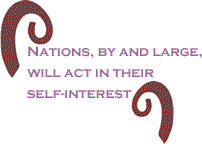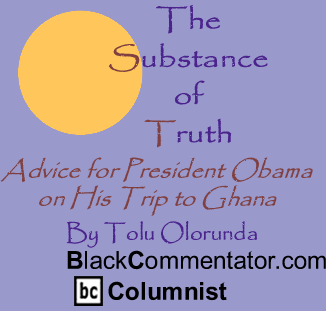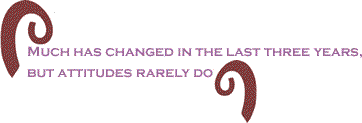| |
|
|
|
|
| |
| |
| |
President
Obama is expected to make an historic visit to Ghana
this weekend. His trip to the West African country will be the
culmination of a busy week in which he is scheduled to touch base
in Russia,
then on to Italy
for the G8 meetings.
 As
expected, news of the president’s decision has already generated
mild hostility between some neighboring countries, including his
ancestral home Kenya, which feel snubbed by the popular Western
leader. But the cantankerous disputes are irrelevant when faced
with the bigger picture looming over our horizon. As
expected, news of the president’s decision has already generated
mild hostility between some neighboring countries, including his
ancestral home Kenya, which feel snubbed by the popular Western
leader. But the cantankerous disputes are irrelevant when faced
with the bigger picture looming over our horizon.
Obama’s
trip to Ghana is significant. The
presence of a Black president on Black land is nothing new to
Africans, but a Black American president is. Many had come before
him, but bore the shades of former colonialists. They pledged
their support for AIDS, Malaria, Poverty, and other exotic
diseases, but the promises soon turned up futile. The most important
question, which must be asked, is if President Obama would, like
those before him, speak with the same forked tongue of imperialism
and condescension, wrapping up lofty ideals in opportunistic advances.
It
may be a long road from query to answer, but if Obama’s 2006
Speech at the University
of Nairobi, delivered upon his historic
trip after being sworn in as U.S. Senator, is any indication,
the answer might not be so farfetched. Sure much has changed in
the last three years, but attitudes rarely do.
In
late August 2006, when Obama returned to the land of his Father’s
birth, he was greeted more prestigiously, it seemed, than a shining
prince. Kenya’s peoples celebrated him as a native son,
a long-lost brother who never really left home. Obama enjoyed
the charity and compassion of his cousins, receiving warmth and
welcome at every turn. On August 28, 2006, he gave a speech titled,
“An Honest Government, A Hopeful Future.”

The
problem with Obama’s hell-raising speech was less about his remarks,
and the veracity of them, and more about the hypocrisy with which
they were delivered. Obama railed against corruption and embezzlement,
but as one whose alliances with notorious slum-lord Tony Rezko
was made infamous a mere year later, it seemed as though he was
in no position to pass judgment. As the political godson of Illinois
Senate President Emil Jones Jr., a man known
for his entrenchment in Chicago old-school politics, he was perhaps
the least qualified to dictate to Africans what corruption is
and isn’t, and how to get rid of it.
Obama
began, as he always does, with the personal narrative which has
attracted so many followers. He told of his first trip
to Kenya in 1987, and the revelations
it brought forth:
I
learned that my grandfather had been a cook for the British and,
although he was a respected elder in his village, he was called
“boy” by his employers for most of his life. I learned about the
brutal repression of Operation Anvil, the days of rape and torture
in the “Pipeline” camps, the lives that so many gave, and how
my grandfather had been arrested briefly during this period, despite
being at the periphery of Kenya’s liberation struggles.
Soon
after, he lamented the “contradictions of Kenya, and indeed, the
African continent as a whole” - a reminder “that the hopefulness
of the post-colonial era has been replaced by cynicism and sometimes
despair, and that true freedom has not yet been won for those
struggling to live on less than a few shillings a day.”
 Obama
asked why Kenya is not today as prosperous as South Korea, when in the early 1960s its gross
national product “was not very different from that of South Korea.” He explained
that the “legacy” of colonialism, the burden of national boundaries,
and inter-continental free-trade draconian policies, are the true
culprits; but Kenya must “do its part. It
cannot wait for other nations to act first. The hard truth is
that nations, by and large, will act in their self-interest and
if Kenya does not act, it will
fall behind.” Obama
asked why Kenya is not today as prosperous as South Korea, when in the early 1960s its gross
national product “was not very different from that of South Korea.” He explained
that the “legacy” of colonialism, the burden of national boundaries,
and inter-continental free-trade draconian policies, are the true
culprits; but Kenya must “do its part. It
cannot wait for other nations to act first. The hard truth is
that nations, by and large, will act in their self-interest and
if Kenya does not act, it will
fall behind.”
Obama
was now ready to drive into the lane he desperately sought
after. He was now prepared to call into question Kenya’s, and consequently Africa’s,
inability to “create a government that is transparent and accountable.
One that serves its people and is free from corruption.” Obama
informed Kenyans that their “freedom” was being threatened by
“corruption”; not corruption among Western countries and armies,
but corruption solely perpetrated by their own government. Corruption
“stifles development – it siphons off scarce resources that could
improve infrastructure, bolster education systems, and strengthen
public health,” he said. In an unforeseen twist of irony, President
Obama, almost prophetically, declared: “What’s worse - corruption
can also provide opportunities for those who would harness the
fear and hatred of others to their agenda and ambitions. It can
shield a war criminal.”
Yes,
corruption can, indeed, shield war criminals, and if Obama
took himself more seriously, he might hold far different ideas
on torture and state secrets and wars, than he currently does.
Before
long, Obama, again as he’s infamous for, turned to the
Youth in the audience, urging them to “learn” from the “mistakes
and disappointments” of their Fathers and Mothers.  They
must “muster the courage to fulfill the promise of our forefathers
and lead our great nations towards a better future,” he insisted. They
must “muster the courage to fulfill the promise of our forefathers
and lead our great nations towards a better future,” he insisted.
His
work was about done at this point. Mission
accomplished. One way or another, he had delivered the message
he sought to - corruption is a bad, bad, bad thing. It is the
greatest factor holding back Africans from achieving their destiny.
If they would elect smarter leaders, and less corrupt ones, all
their problems would vanish at-once, opening up new avenues of
prosperity and promise.
But
I hope President Obama’s address in Ghana
this weekend will not follow the same dreadful pattern. I hope
he will be a lot more sincere than he’s been in times past. I
hope HE will muster the courage to speak candidly against
European influence in African governments, against Western arrogance
on African shores, against ongoing colonialism in African land.
I hope he will tell our beloved Ghanaians about his AFRICOM
agenda, and what it means for their sovereignty - which they so
cherish. I hope he will open up the window of transparency into
his foreign policy, revealing why Africans better get wise fast
before they’re suckered into wars they should want no part of.
I hope he will condemn the ruthless exploitation of African resources
by dictatorial foreign companies which hold no bars in their theft
of precious minerals from African seas. I hope he will be just
as perceptive on the root of the problem as he would be on the
solutions needed to solve them.
 I
hope he will not perform the same stage craft that has
endeared millions of people, foolishly, to his camp. I hope he
will not rehash the same narrative scheme - 1). Personal background
2). National accomplishments 3). National failures 4). International
disappointments 5). Hope and Possibilities - that has rendered
predictable his international speeches. I hope he will not wear
that hat of condescension and didacticism which his predecessors
had no problem putting on - whenever present before dark faces.
I hope he will not make a fool of himself by demanding that Ghana,
and Africa at-large, join him in fighting
against Al-Qaeda and other extremist forces - appealing to an
unfound, ill-defined, and unstated common interest. I
hope he will not perform the same stage craft that has
endeared millions of people, foolishly, to his camp. I hope he
will not rehash the same narrative scheme - 1). Personal background
2). National accomplishments 3). National failures 4). International
disappointments 5). Hope and Possibilities - that has rendered
predictable his international speeches. I hope he will not wear
that hat of condescension and didacticism which his predecessors
had no problem putting on - whenever present before dark faces.
I hope he will not make a fool of himself by demanding that Ghana,
and Africa at-large, join him in fighting
against Al-Qaeda and other extremist forces - appealing to an
unfound, ill-defined, and unstated common interest.
I
believe President Obama is no fool. He knows the depth of the
African’s keen political insight - in many ways sharper than her
African-American family’s. It would do him well to be thoughtful,
thorough and, above all, truthful.

BlackCommentator.com Columnist, Tolu Olorunda, is an
activist / writer and a Nigerian immigrant. Click here
to reach Mr. Olorunda.
|
| |
|
|
|
|
Any BlackCommentator.com article may
be re-printed so long as it is re-printed in its entirety and full
credit given to the author and www.BlackCommentator.com. If the
re-print is on the Internet we additionally request a link back
to the original piece on our Website.
Your comments are always welcome.
If you send us an eMail message
we may publish all or part of it, unless you tell us it
is not for publication. You may also request that we withhold
your name.
Thank you very much for your readership.
|
|
| |

Your comments are always welcome.

|
|
July
9, 2009
Issue 332 |
 is
published every Thursday
is
published every Thursday
|
Executive Editor:
Bill Fletcher, Jr. |
Managing Editor:
Nancy Littlefield |
Publisher:
Peter Gamble |
| Est. April 5, 2002 |
Printer Friendly Version
in resizeable plain
text format or pdf
format. |
|
|
|
| Frequently
Asked Questions |
|
|
|
|
|
|
|
|
| |
 |
 |
|
 |
| |
| |
|
|
|
|
|
| |
| |
|







































 Obama
asked why
Obama
asked why  They
must “muster the courage to fulfill the promise of our forefathers
and lead our great nations towards a better future,” he insisted.
They
must “muster the courage to fulfill the promise of our forefathers
and lead our great nations towards a better future,” he insisted.





